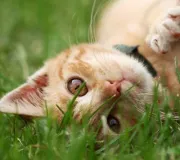“Starter birds” are those that are generally easier to care for and require bit less of a time investment than others. Of course, the final choice of bird is completely up to you, but consider these breeds if you’re new to bird ownership and don’t want to jump headlong into an 80-year relationship with a parrot.
Canary
Canaries are fairly inexpensive birds, and they don’t require a huge amount of human interaction. Canaries tend to amuse themselves, and any humans watching in the process! Select a large enough cage, clean it regularly, and supply your canary with plenty of fresh food and water, and your bird will be happy and content. Ask your St. Lucie County veterinarian about the specific care requirements for canaries or other birds you’re considering.
If you want a singing canary, select a male, as the male gendered birds sing. They may be more expensive, though. Generally, canaries are good for busy people or even kids who aren’t ready for large commitments.
Finch
Much like the canary, the finch is a bird that’s easy to care for, doesn’t require a lot of interaction, and shouldn’t be too costly. They do enjoy hanging out with other finches, so you might consider getting two at a time so your birds can have a feathery companion throughout the day. All things considered, they’re great for beginning bird owners.
Budgie
The budgerigar parrot is slightly less demanding than other parrots. It can “talk” like other parrots, but usually won’t do so at a loud volume or all that often. A budgie will require moderate care, and will generally remain happy and healthy if you provide it with a clean, safe environment and plenty of food and water. Of course, like any parrot, a budgie will need more human interaction than, say, canaries or finches, but the upside is that it will be more playful and receptive than either of those birds.
Remember that just because these birds need less care than others, they still need plenty of attention and diligent upkeep. Never neglect any bird. Talk to your St. Lucie County veterinarian to learn more about the bird that might be right for you and your family.


Leave a Reply
You must be logged in to post a comment.